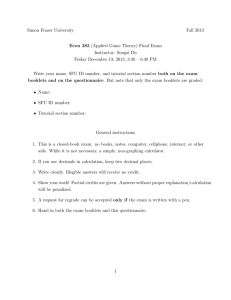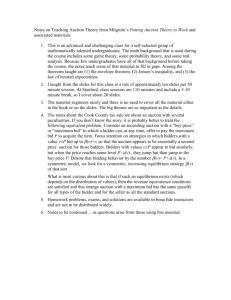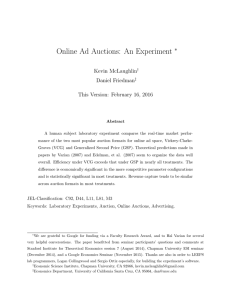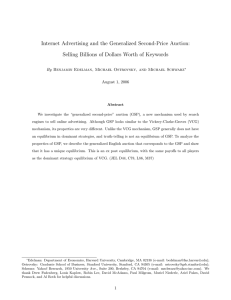ppt
advertisement
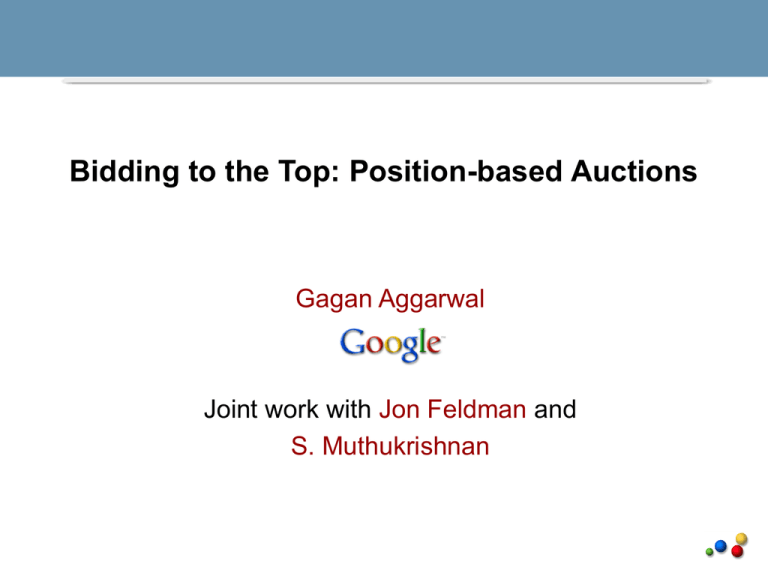
Bidding to the Top: Position-based Auctions Gagan Aggarwal Joint work with Jon Feldman and S. Muthukrishnan Position 1 Position 2 Position 4 Generalized Second Price (GSP) Auction Advertisers enter bids for keyword “car wash”. Query comes, ads ranked by bid. Price of ad = bid of next advertiser in ranking. Bid Price ACarWash.com $0.32 $0.24 BrightAndClean.com $0.24 $0.17 CleanCars.com $0.17 $0.14 DoVisitUs.com $0.14 - Advertiser pays only if user clicks on ad. Google: [effective bid] = [bid] £ [quality] Maturing Business of Sponsored Search Sponsored Search is big business. Significant portion of revenue of Google, Yahoo!, etc. Increasing percentage of advertising budget of many large advertisers. Huge tail of small advertisers. Advertisers are demanding more features, more options, more control. • Analytics and Conversion Tracking • Ad Diagnostics • Content Ads • Negative Keywords • Position Preference Outline of Talk Motivation for position control. Generalization of GSP auction (GGSP?) to handle position constraints. Characterization of equilibria and relationship with “truthful” VCG auction. Parallels some of the results of [Edelman, Ostrovsky and Schwarz, 2006] for GSP. The Importance of Being Placed High Position among ads has many effects. Higher ads get more clicks. Placing above a particular competitor is often important. Higher ads have positive branding effect, even if they do not get clicked. [IAB study] Is there a natural generalization of GSP that takes position constraints as input? We study prefix constraints: Advertiser i gives bid bi and position cutoff i Ad i is never placed below position i Top-down Auction Mechanism (GGSP) Advertiser i gives bid bi and position cutoff i For each position j from 1 … k : Run a second-price auction among advertisers whose i ¸ j. Place the winner at position j and remove her from the advertiser pool. Example: GGSP Suppose number of positions available k = 3. bid Cutoff i price A.com $6.10 2 $5.90 B.com $5.90 3 $3.00 C.Com $5.30 1 - D.com $3.00 3 $2.30 E.com $2.30 3 Top-down Auction Mechanism (GGSP) Advertiser i gives bid bi and position cutoff i For each position i from 1 … k : Run a second-price auction among advertisers whose i ¸ j. Place the winner at position i and remove her from the advertiser pool. Is this a “good” mechanism? … what even makes a mechanism good? GSP is Not Truth-Revealing GSP is not truth-revealing, i.e. it may not be optimal to bid true value-per-click. Example: Existing bidders Bid Clicks Alice.com $3.00 100 Bob.com $2.00 80 Carol.com has value $3.10 per click. Utility of Position 1 = ($3.10 - $3.00) £100 = $10. Utility of Position 2 = ($3.10 - $2.00) £ 80 = $88. Locally stable. Vickrey-Clarke-Groves (VCG) Auction VCG is a generic truthful mechansim: Allocation = the one that maximizes social welfare or total value (assuming value = bid) Price (i ) = cost imposed by i on others = total increase in others’ value if i were to disappear. To run VCG for prefix auctions: Find max-value cutoff-respecting matching of ads to positions. For each advertiser i , • Remove i from the pool of advertisers. • Recalculate max matching. • Set price(i ) = value of all other advertisers. Ordering Property Definition: An ad shown higher has a higher bid. GSP and GGSP have ordering property. With position constraints, VCG does not have ordering property. Example: VCG Outcome Suppose number of positions available k = 3. Bid Cutoff i Position A.com $6.10 2 2 B.com $5.90 3 3 C.Com $5.30 1 1 D.com $3.00 3 - E.com $2.30 3 Ordering Property Definition: An ad shown higher has a higher bid. GSP and GGSP have ordering property. With position constraints, VCG does not have ordering property. Without position constraints, VCG has ordering property as long as the click-through rates are “separable”. Truthful Locally Stable Ordering Property VCG Yes Yes No GGSP No Yes Yes Our Main Theorem Theorem: For a fixed set of values, the top-down auction mechanism (GGSP) has a Nash equilibrium whose (allocation, pricing) is the same as VCG. Furthermore, This equilibrium is envy-free (symmetric). Among all envy-free equilibria, this one is bidderoptimal. Key Points in Analysis (No Position Constraints) A B C D .. . Z To show that advertisers don’t envy each other in the VCG outcome, we need a handle on VCG prices of different positions relative to each other. Without position constraints, simple relationship: VCG price (B) = value(i) i = C…Z VCG price (C) = i = D…Z value(i) price(B) = price(C) + value(C) Now VCG Prices are More Unruly A When an advertiser is removed, things can change dramatically … B We need to better understand the structure of the change in allocation. C D .. . Z A Nugget A B C D .. . Z Chain: sequence of one-step changes in optimal allocation when an advertiser removed. Claim: The smallest chain formed on removal of an advertiser cannot contain a down link followed by an up link. A Nugget A B C D .. . Z Chain: sequence of one-step changes in optimal allocation when an advertiser removed. Claim: The smallest chain formed on removal of an advertiser cannot contain a down link followed by an up link. A Nugget Claim: A shortest chain cannot contain a down link followed by an up link. A B … i … j ci = clicks at pos i [ci > … > cn ] vi = value of bidder in VCG pos i Proof: Use shortcut. v = ci (vj – vk) + ck (vk- vj) = (ci – ck) (vj – vk) … k … ci ¸ ck ? … yes vj ¸vk ? … yes, otherwise original solution would switch j and k. Z v ¸ 0, i.e. new allocation is no worse and has a shorter chain. General Position-Based Bids Arbitrary Ranges – Top and bottom cutoffs. For this, GGSP is Locally stable. No ordering property. May not have equilibrium matching the VCG outcome. What if an advertiser could submit different bids for different positions? Since no natural ordering of positions left, ordering property doesn’t make sense any more. Suppose allocation using maximum matching. Theorem: Maximum matching + local stability VCG. Open Questions What makes a mechanism “good”? Is truthfulness a goal in itself or a means to a goal? If it is not the goal, what is? Stability? Ease of understanding? Simple bidding strategies? Something else …? Thanks for your attention!
